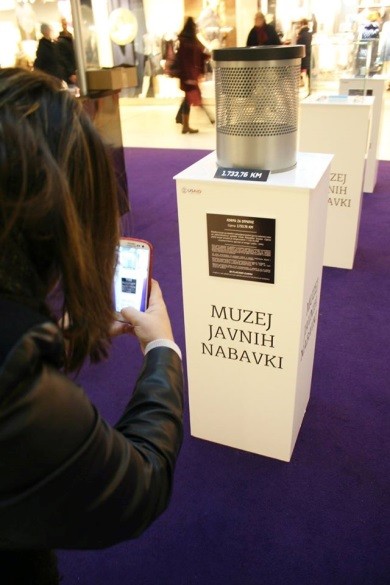Speeches Shim

April 2017—A lot of taxpayers’ money has gone up in smoke with the purchase of $700 ashtrays and other items in Bosnia and Herzegovina (BiH). But most citizens did not know how bad it was until recently.
In December 2015, USAID organized a traveling exhibition—We Pay the Price: An Exhibition of Shocking Public Procurement Purchases in BiH—so citizens could see with their own eyes examples of the corrupt and wasteful spending that takes place in public procurement and, hopefully, to get them engaged with civil society campaigns to change procurement processes.
In particular, the campaign highlighted the need to amend the BiH Public Procurement Law. Earlier in 2015, with support from USAID’s Anti-Corruption Civic Organizations’ Unified Network (ACCOUNT) activity, local organizations drafted amendments to improve the law by increasing transparency (making annual procurement plans and reports obligatory for public institutions and companies), strengthening conflict of interest provisions, and increasing sanctions for violations. The amendments were handed over to a small group of supportive members of Parliament on December 9, 2015, which marked International Anti-Corruption Day and the launch of the USAID campaign.
The two-month exhibition contained a selection of the most outrageous examples of how non-transparent procurement processes, corruption and bribes inflated the prices paid for common goods or supplies, including an office wastebasket for $938, a loaf of bread for $27, and an $8 paperclip. Data used in the exhibit was culled from official government audit reports.
Price tags and descriptions were displayed with each item in addition to the importance of the proposed legislative amendments, and how they would prevent similar theft and fraud from occurring in the future.
The exhibition was showcased in shopping malls and cafés in a dozen cities, including Sarajevo, Banja Luka, Mostar, Doboj, Tuzla, Bihać, Zenica, Trebinje and Brčko.
And it sparked a strong public reaction. People took selfies in the exhibit and brought their children to see it. The estimated number of visitors to the exhibit was over 1 million.
“What a great thing this is. Usually, we citizens have no clue about public procurement, let alone about crimes behind the scenes. In this exhibit, everything is clearly explained, and I will now pay more attention to where the money from my taxes goes,” Halida Smajic said at the Sarajevo exhibition.
Word of the exhibition spread fast through local, regional and social media. One visitor created a subreddit thread on the exhibit that was upvoted almost 900 times and viewed 20,000 times. USAID/BiH’s Facebook post about the exhibit received over 1,000 likes, with an additional 2,000 shares. More than 170,000 people viewed the post, making it the most popular post by far in the page’s history.
While the amendments to the Public Procurement Law have yet to be adopted by the parliamentary bodies, USAID continues to support civil society advocacy efforts to improve anti-corruption mechanisms within the public procurement system.
USAID’s ACCOUNT project, which runs from July 2015 to July 2019, is designed to reduce government corruption in BiH through public awareness campaigns, legal assistance to whistleblowers, strengthening of civil society, and anti-corruption legislation.
LINKS

Comment
Make a general inquiry or suggest an improvement.